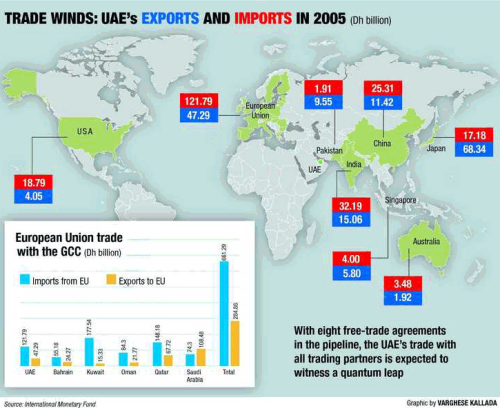Emirates Today | 24 February 2007
Trade deals to position UAE as economic hub
By Matt Smith
The UAE is negotiating eight free-trade agreements with key economic blocks that will have an impact on trade worth Dh388 billion, according to 2005 figures, and cement the country’s position as the economic hub of the Middle East.
The UAE, together with its GCC partners, is close to finalising a free-trade agreement (FTA) with the European Union, with the two groups due to meet for further talks in Brussels next week.
Juma Al Kait, the director of World Trade Organisation affairs and free-trade agreements at the UAE Ministry of Economy, said the conclusion of an FTA between the GCC and the EU is imminent.
"We expect it to be finalised very soon. We are in the last 100 metres of the marathon," said Al Kait.
However, he said that with the agreement of all six GCC countries required, there could be some last-minute hitches that could delay the deal.
The EU-GCC agreement will remove a wide range of trade barriers on both sides and could become law as early as January 2008, according to Karl Friedrich Falkenberg, the director for free-trade agreements at the European Commission.
Stark contrast
The progress of the EU deal is in stark contrast to the failure of the UAE and the US to secure a bilateral FTA, with talks indefinitely suspended.
This means the two sides are unlikely to meet a March 31 deadline imposed by the US Congress if the deal is to be considered under President George W Bush’s trade negotiating mandate, which expires in June.
"The agreements with the EU and the US are the major ones for exports, economic diversification and attracting foreign investment into the region," said Steve Brice, the head of research Middle East for Standard Chartered.
"The EU deal should be the priority because this is likely to face less problems than the American one," he said.
Brice predicts the EU-GCC trade agreement will be signed this year, possibly by the end of June. He is far less optimistic about securing a similar deal with the US.
"The US Congress will be difficult, as the prospective deal between America and Oman has shown.
"This may be impossible until the end of the current US administration. The American FTA seems to be more geopolitical in nature than economic.The Americans want good relations with friendly Middle East countries, but the P&O ports deal will play on people’s minds." When an FTA is finalised with the US, the UAE’s banking industry is likely to attract American investment, according to a report by the Dubai Chamber of Commerce and Industry.
Nasser Saidi, the chief economist at the Dubai International Finance Centre, also welcomed the prospective FTAs. "The EU is the UAE’s major trade partner and is practically on a par with Asia so it is important to expand trade relations on a multi-lateral basis.
Closer integration
"The EU is a net exporter of capital and this agreement will help set the framework to facilitate outward investment into GCC countries and companies, while also bringing closer integration with the global economy.
"The UAE is unique in that it is a very open economy. What is vital is the extent to which the EU opens up its markets to allow investment by GCC companies." The GCC is also in talks over FTAs with Australia, India, Pakistan, Singapore, Japan and China.
Saidi said these agreements would aid the UAE’s drive to cement its position as the economic hub of the Middle East, but with the country’s external tariffs low at around five per cent, he warned FTAs may not have a significant impact on trade.
He said: "Reducing trade barriers will reinforce the key logistical and geographical position of the UAE. The big impact will come from facilitating investment and allowing the transfer of technology.
"Traditional trade agreements were strictly limited to goods, but now they include services and investment."
Increased investments
The main aspect would be opening up the chance of increased investment from European countries.
"EU-based companies are already investing in the country, but anything which tightens the bonds between the region and Europe is a positive step," said Brice.
He said Sharjah’s manufacturing industries would benefit most from reduced export restrictions, as would Abu Dhabi’s expanding aluminium smelting sector, while the benefits to Dubai would be limited because its economy is more service-based.
The GCC completed the fourth round of FTA talks with China in June last year. The next stage has yet to be scheduled but Al Kait said he was hopeful the agreement could be concluded before the end of 2007.
In January, the GCC and Singapore held the first round of talks to discuss a possible FTA.This will adopt the FTA principles previously agreed by Qatar and Singapore.
The second round of talks will be held in four months.
Similarly, the UAE’s early discussions with Australia over an FTA have been adopted by the GCC, with talks between the two groups scheduled for this year.
Japan and the UAE held five days of second-stage talks last month to discuss key points including trading goods and services and rules of origin.
The next round will be held by August. Saidi said trade deals with China, South Korea and Japan could enable companies from these countries to assemble goods in the UAE.
Brice added: "It will be interesting to see how the UAE positions itself in the region in future."
